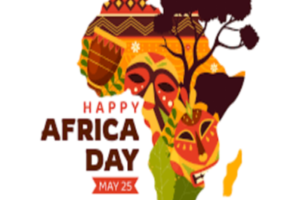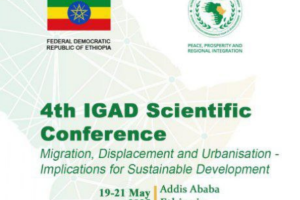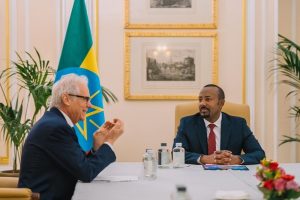The National Dialogue Commission has been formed to try and bring Ethiopians to a kind of consensus airing all their views on what sort of country they envisage for the future. If we want the country to free itself from the past shackles that are keeping it tied to relentless controversies about how it was formed and who took advantage and who got at the receiving end of injustices, we would never be able to move freely into the future and succeed in building a more just, a more equitable, a more rapidly growing economy and a more respectable and sovereign country that tries to be among the leading realities of the continent of Africa.
Ethiopia is currently a federal state trying to apply the tenets of federalism to the best of its capacity. It is now twenty nine years since the federal system has been adopted as a form of administering this enormous country with a plurality of nations and nationalities and arguably this has been found to be the only system that could guarantee the rights of all peoples in this complex society called Ethiopia. However, Ethiopians do not seem to agree on how the country has reached this point in its history and there are multiple narratives that have been presented by many political actors with various political views, and this has been a source of contention and given rise to interminable disputes and controversies that has resulted in not sitting together and discussing things to iron out differences but to try and solve the problem with the use of force.
In the years of the monarchy, multiple liberation movements tied to this and that nationality were seen surging and flexing their muscles against the existing system. With the ideology of the left that largely promoted the idea of the self determination of people, the movements that were conceived, born and grew up in those years have yet to declare that now that a federal system has been formed they can assert their rights within the framework of the constitutional order. The new federal constitution was promulgated in December 1994 and since then there has been the recognition of the equality of the nations and nationalities doing away with the old system that seemed to favour a few entities against the interests of the majority. Clearly the system was unjust for a number of reasons and if there were forces that tried to depose such a system it would not be a surprise. Today all the parameters of political power have changed because the idea that all individuals are born equal and have equal rights in society including political and economic rights is taken for granted.
The issue of human rights is one of the most debated ideas that has been developed in recent decades and no wonder that people all over the world claim their rights as enshrined in all international conventions and protocols that have been incorporated in the constitutions of nations. Ethiopia as well is a signatory of these sacred documents that give full recognition to equality of humans irrespective of their origin, faith, gender and social status. Similarly, political convictions cannot be reason to discriminate one from others and the right to free expression of ideas and opinions, freedom of association as well as all other freedoms that are now taken for granted.
Many people say that Ethiopians’ current major issue is how to agree on a common narrative regarding the formation and history of Ethiopia. There are extremists and divergent positions in this regard and the fact that there have not been all encompassing discussions on these subjects has complicated further the problem and successive governments on power had to tackle these subversive voices with force rather than bring them to the table and discuss the matter wholeheartedly and in great detail with good faith and constructively. Ethiopia cannot exist as a country if each and every nationality tries to form their own independent country in a current reality of the world where more and more unity is advised in order to make one’s voices heard in the international arena.
We can see that Africa’s weakness as a continent is characterized by the existence of more than fifty countries that are not united and hence find themselves at a disadvantage in trying to deal with the rest of the world. This reality of Africa has been unfortunately created by the colonial powers which divided it the way they preferred or found convenient for their economic and other strategic benefits and never considered the reality of the societies that found themselves divided finding themselves at times in different states while they were probably parts of an extended family. Today Africa has the big homework of trying to come to terms with its past determined by others and now that it has the opportunity to right those wrongs, there are some forces that try to prevent it from doing so because a strong and united Africa could have tremendous influence in the current world.
Ethiopia is more or less found in the same predicament owing to a past history that has become a source of contention. It is finding it increasingly difficult to come to terms with its past and settle once and for all with a solution that can bring all parties into consensus. When such discussions are tabled those who see themselves as the aggrieved party in the process of the formation of this country argue that they have been forced into a union and that they were never consulted about it. They argue this is a fundamental wrong with which they can never agree. The problem with such narrative seems to disregard historical facts that have been developing along the years and turning back would be practically impossible unless there emerges interminable conflicts involving a plethora of people who have been intermingling across centuries. Those who still argue that peoples’ identities can be maintained pure and pristine must be living in a utopia because there cannot be any reality that can accommodate such a philosophy because people continue to mingle and intermarry and trying to find a pure race or a pure identity would be unrealistic.
Ethiopia is a country of multiple nations and nationalities and trying to divide it along ethnic lines has been a source of violence and contention that can only result in disasters. Societies are not made on calculations and if every individual has their rights respected and their aspirations fulfilled why shouldn’t they live in harmony with other humans regardless of their origin or identity? Today we see a continuous intermingling of peoples of various origins not only in Ethiopia but also across the world and the often cited easy reference is the USA or Canada where a variety of nationalities of various origins live together independently and freely compromising in their beliefs and customs but not being a source of hostilities. This is not to say that these societies are perfect and do not have social and political problems. There are no societies free of problems but it is the way they settle their problems that makes them advanced and civilized nations.
They all have constitutions by which they are governed and they respect those laws equally. They know that they have issues on the way those countries have been formed but they continue to discuss them freely and openly and try to reach a consensus that can be of satisfaction to all.
They were societies that were based on inequalities and there have been identities that have been abused and neglected, not allowed to take part in the political discourse, and they have passed along many complicated paths that finally seem to reach a certain stage whereby inequalities cannot be tolerated anymore and every individual should be attributed with the same rights that others like him have and no one is deliberately and systematically left behind to suffer the bad effects of the political order, if any.
Ethiopia is a country that is still evolving under a new system. It has now been almost thirty years since the formation of the federal system. The constitution has been in vigor for the last three decades and it has largely been a work in progress in terms of its strict application. There are parties that are opposed to its very promulgation alleging that they were not consulted during its formation and that their interests have been ignored. However, there is also the understanding that the constitution being the work of humans no one claim that it is perfect and hence cannot be discussed.
The recently established National Dialogue Commission can have this issue discussed in a free and candid manner because it is the right place where individuals, groups and organizations can propose their ideas and have them debated and considered for eventual change. The Commission has welcome every group in the country to come forward with their ideas and make it a subject of discussion in a serious and positive manner so that things are made clear to all and the future of the country is not darkened by interminable contentions that continue to haunt it. Ethiopians must come to terms with their past and agree on a new blueprint based on equality, unity and sovereignty of the nation and not be made exposed to the joys of its adversaries and enemies that do not want its growth and prosperity. Ethiopians must rise up to the challenges that the modern world presents and the country has the potential to succeed if we settle our basic differences that continue to be bones of contention. A multiethnic, multicultural and multi-religious Ethiopia is possible to exist and thrive without having to disintegrate as some of its enemies would like to. Ethiopians have a glorious history of unity in times of crisis and this could be one of them.
BY FITSUM GETACHEW
THE ETHIOPIAN HERALD WEDNESDAY 29 NOVEMBER 2023




